It makes sense that many people want to maximise their muscle mass. They'll improve their athletic performance, potentially look better, feel better and will be stronger and better equipped for day-to-day life. That being said, there is a lot of confusion out there as to the best way to increase lean mass and build muscle.
More...
Usually, the first place most people start is modifying their diet. By adapting your macronutrient intake, you can hope to improve your body's ability to build muscle. For most people, when they think of building muscle, the main nutrient they go to is protein.
There's good reason for this - lots of research has taken place over the years. It's clear - adequate protein intake is important for your body to synthesis new muscle protein.
Protein makes up most of the tissues of our body. That is to say our muscles are mainly made up of protein along with many of our organs.
It follows then that eating copious amounts of protein leads to huge gains in muscle mass. Right?!
Not quite...
Breaking down protein requirements for building muscle
More is not necessarily better.
There does come a point at which the level of benefit gained is less than the cost and effort of consuming the extra protein.
Generally speaking, thanks to a study at the University of Stirling, 20-40g of a highly bioavailable protein consumed after training will maximise muscle protein synthesis.
Proteins with high bioavailabilty include sources such as meat, eggs and whey. If you're in the market for a protein supplement, then you should definitely read my guide on choosing a good protein powder.
It seems that whether closer to 20g or closer to 40g is depended on the type of training session you perform. Ultimately it's the amount of muscle tissue that's been challenged during the workout that's important.
Researchers found that excess protein above this level was used in two main ways:
- making tissue proteins other than muscle
- processed in the level and turned into either glucose or fatty acids
It's important to note your body doesn't 'waste' this excess protein. However it won't build more skeletal muscle with it.
A good rule of thumb to follow, based on the research is as follows:
If you're looking to increase muscle mass, consume at least 1.6g of protein per kilogram of body weight each day.
For me, being roughly 70kg, that equates to a target of around 112g per day.
Bear in mind, this target is for healthy individuals who aren't dieting. That is to say, if your circumstances are different, or you are restricting calories to lose fat, then your requirements may be different. As always, speaking to a registered dietitian or sports nutritionist for customised advice is beneficial.
In essence, just gulping down several protein shakes each day to increase your intake is unlikely to lead to enhanced muscle gains. Furthermore, it may just lead to abdominal cramps and discomfort.
READ ALSO: Eating for Strength & Gaining Muscle Mass
So, when it comes to muscle growth, is it just protein intake we need to worry about?
Definitely not.
In fact, focusing solely on dietary protein levels can mean we neglect other nutrients. Nutrients needed to keep your body healthy and performing well.
Using carbohydrates to create an energy surplus and build lean mass
Muscles like carbohydrate, particularly when they have high-intensity activity to perform. These high-intensity workouts are the type of training that result in muscle growth anyway. It follows then that to build muscle efficiently, we should be eating carbohydrate.
If you are looking perform high-intensity training well, then having sufficient carbohydrate in your diet is important. If you're training more than an hour each day, or multiple times in one day, then it's essential.
We also need to look at overall energy (calorie) intake. Building muscle requires your body to devote energy towards that goal.
Ideally, we'd want to be in a caloric surplus to provide the best muscle-building conditions possible.
While it's not impossible for your body to develop lean mass in an energy deficit, a better long-term approach is to ensure a daily excess of calories.
How many more calories each day will depend on a number of factors and is beyond the scope of this article. Again, if you're not sure, speak to an accredited sports nutritionist who can calculate your exact requirements and put together a customised meal plan for you.
How quickly can I expect to build muscle?
Usually, building muscle takes a bit of time, hard work and dedication. It might be a long and slow, but rewarding journey.
In this age of Instagram, it's common to have unrealistic expectations of how quickly you can pack on muscle. This can lead to disappointment after a few months.
Below, I've outlined for you realistic amounts of lean muscle that you can expect to gain depending on your training history. Bear in mind, this assumes you're already fit and healthy and following a well-structured training program and have optimised your nutrition.
How quickly can a male beginner gain lean mass?
Males in their first year of weight training can generally expect to gain 1 to 1.5% of their body weight each month.
For a 65kg male, this equates to between 0.65 and 0.98kg.
In 12 months, that 65kg male could theoretically expect to achieve a maximum of 77.7kg. Setting a goal above this would likely end in disappointment. Further to this, that figure is based on perfect nutrition over the whole year along with a correctly planned out and executed training program.
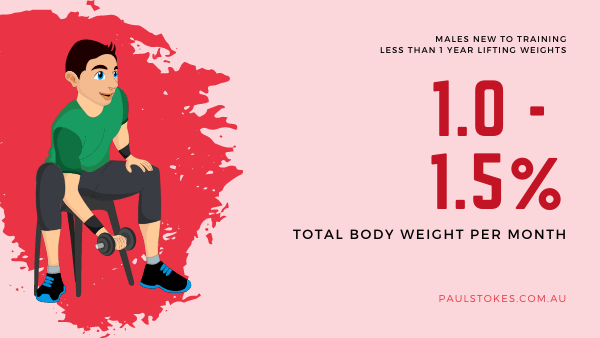
Males in their first year of training can expect to put on 1-1.5% of their body weight in lean mass each month
Can beginner women build muscle at the same rate as men?
Not really, due to a number of factors. That being said, they can still expect decent gains with the right training and nutrition behind them.
A female can expect to build 0.5 to 0.75% of their body weight in lean mass each year.
For a 58kg woman, this would be a gain of between 0.65kg and 0.87kg.
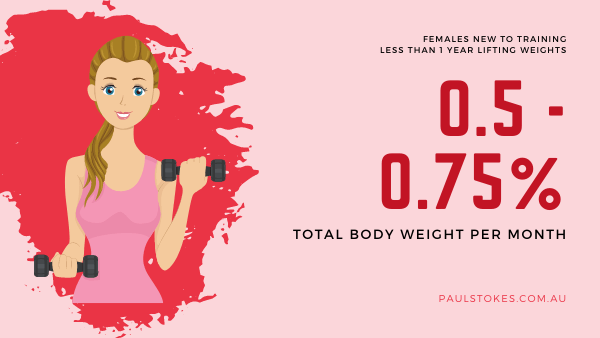
Women in their first year of training could expect to put on 0.5-0.75% of their body weight in lean muscle mass
What happens after the first year of weight training?
Well, for a number of reasons, the biggest gains you can ever expect from a new program will be right at the very start.
As your body grows and gets bigger and stronger, the rate at which you put on muscle will slow.
This makes sense from an evolutionary and logistical view point. Muscle growth is not linear and your body will not continue to grow indefinitely.
For men, after their first year of training, their rate of lean mass gain will reduce to about 0.5-1% body weight per month.
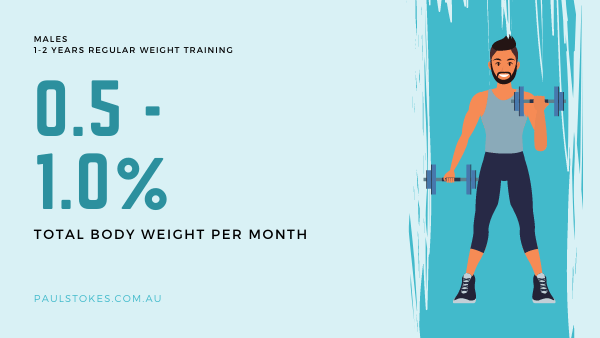
After training continuously for a year, men will gain muscle at a rate of 0.5-1% of their body weight each month
In women, it will be around 0.25-0.5% of an increase.
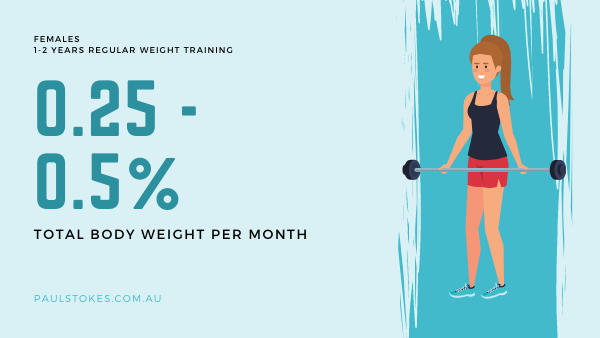
In women, muscle growth rates will be around 0.25-0.5% of body weight each month in their 2nd consecutive year of weight training
Will experienced weight lifters grow more quickly?
Unfortunately not.
By this stage, a dedicated weight trainer's body will adapt and have reached a good deal of muscle mass already.
After 3 consecutive years of regular weight training, lean mass gains will come slower for both men and women.
In men the rate will be between 0.25 - 0.5% of their body weight.
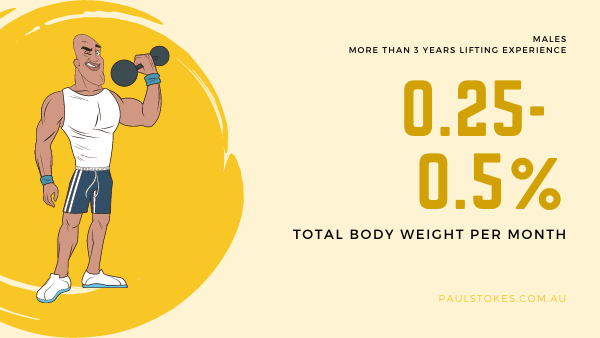
Experienced male weight trainers should target lean mass gains of around 0.25 to 0.5% body weight per month
In women, it will drop to 0.13 - 0.25% per month.
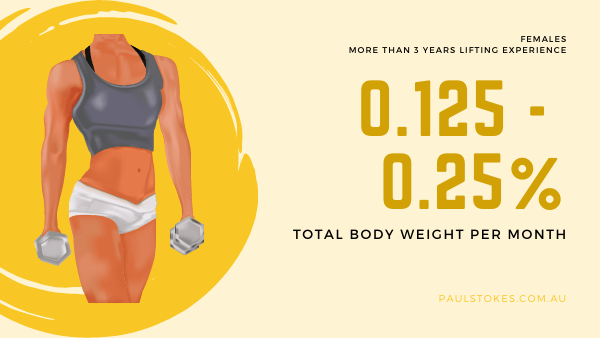
Females who've been training regularly for several years should aim for lean mass gains of 0.125 to 0.25% per month
So hopefully that covers a bit more ground for you.
You may now be aware of requirements other than protein when it comes to putting on muscle. In later articles, we'll also look at the micronutrients you'll want in good supply to maximise your gains.

